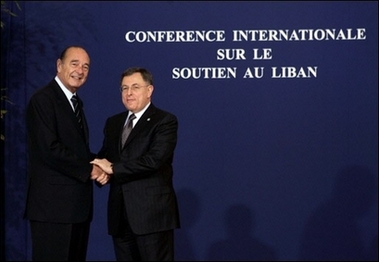 Saudi Arabia, the United States, France, EU and other international donors pledged more than 7.6 billion dollars in aid to Lebanon to support the government. The pledges were made Thursday during a one-day international donors’ conference held in Paris. In his opening speech, Lebanese Prime Minister Fouad Siniora thanked the participants from some 40 countries for their support, and appealed to foreign donors for further financial support, which he said was vital for Lebanon
Saudi Arabia, the United States, France, EU and other international donors pledged more than 7.6 billion dollars in aid to Lebanon to support the government. The pledges were made Thursday during a one-day international donors’ conference held in Paris. In his opening speech, Lebanese Prime Minister Fouad Siniora thanked the participants from some 40 countries for their support, and appealed to foreign donors for further financial support, which he said was vital for Lebanon
 A protester stands between soldiers during a general strike called by the opposition in Kaslik area, north of Beirut January 23, 2007. Thousands of Lebanese protesters blocked main roads in Beirut and around the country with rubble and burning tyres on Tuesday at the start of a general strike called by the opposition to try to topple the government. REUTERS/George Abdallah (LEBANON) To view more pictures please click READ MORE
A protester stands between soldiers during a general strike called by the opposition in Kaslik area, north of Beirut January 23, 2007. Thousands of Lebanese protesters blocked main roads in Beirut and around the country with rubble and burning tyres on Tuesday at the start of a general strike called by the opposition to try to topple the government. REUTERS/George Abdallah (LEBANON) To view more pictures please click READ MORE
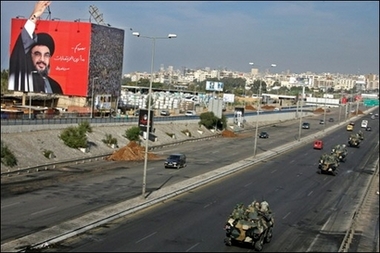 BEIRUT (AFP) JAN 24 – Calm returned to Lebanon as roads were cleared and Beirut airport reopened after the opposition called off a general strike that sparked deadly street fights ahead of a donor conference in Paris. Traffic moved freely Wednesday after tractors and cleaners worked all night to clear tyres, sand and rubble from streets blocked in an opposition show of force on Tuesday aimed at ousting the Western-backed government.
BEIRUT (AFP) JAN 24 – Calm returned to Lebanon as roads were cleared and Beirut airport reopened after the opposition called off a general strike that sparked deadly street fights ahead of a donor conference in Paris. Traffic moved freely Wednesday after tractors and cleaners worked all night to clear tyres, sand and rubble from streets blocked in an opposition show of force on Tuesday aimed at ousting the Western-backed government.
Many shops also reopened, although some waited until noon to ensure the situation had returned to normal. The state-run Lebanese University and many schools across the country stayed shut.Tuesday’s strike turned violent as opposition militants burned tyres, blocked roads and fought street battles with pro-government supporters that left three people dead and 133 others wounded.The violent protests paralysed Lebanon for a day and added to concerns over the stability of a country still bearing the scars of the 1975-1990 civil war and last summer’s massive Israeli war against the Shiite Muslim Hezbollah.
PARIS – The tug-of-war for control of Lebanon takes a financial turn Thursday, with high-ranking officials from 35 mostly Western and Gulf countries meeting in Paris seeking to raise billions of dollars in aid for Prime Minister Fuad Saniora’s embattled government.
Saniora left Lebanon for Paris on a private jet Wednesday, a day after Hezbollah-led protesters who want to topple him clashed with government supporters across the country. At least three people were killed and dozens injured in the violence.
The United States and other Western nations that support Saniora see crucial stakes in Lebanon, hoping the country can emerge from years of war as an oasis of stability in the restive Middle East and stand on its own without interference from countries like Syria or Iran
Analysts expect the countries meeting in Paris to raise $5 billion in grants and loans to help cut Lebanon’s public debt and pay for rebuilding costs after the 34-day war between Israel and Hezbollah fighters last summer.
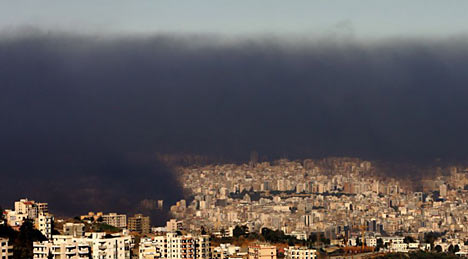 Jan 24, Life was returning to normal in the Lebanese capital and around the country Wednesday, a day after violent confrontation between government supporters and opponents killed three people and wounded dozens. The violence was the worst escalation of the opposition’s campaign to topple Prime Minister Fuad Saniora’s Cabinet.
Jan 24, Life was returning to normal in the Lebanese capital and around the country Wednesday, a day after violent confrontation between government supporters and opponents killed three people and wounded dozens. The violence was the worst escalation of the opposition’s campaign to topple Prime Minister Fuad Saniora’s Cabinet.
Most private and public schools that closed Tuesday after the opposition called a general strike against the government reopened Wednesday as did banks and commercial shops in Beirut and other cities. The road to the airport, closed by burning tires and earthen barricades set up by the opposition, was reopened by the Lebanese army shortly after midnight Tuesday. This allowed a Middle East Airlines plane to fly to Milano Wednesday morning. Roads at Beirut’s northern and southern entrances were reopened to traffic Wednesday after they were blocked by burning tires and sand barricades by protesters.
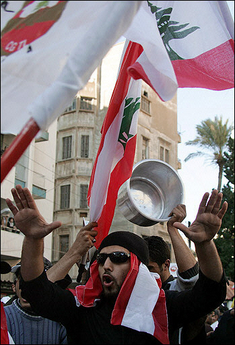 By Tom Perry BEIRUT, Jan 23 (Reuters) – Lebanon’s opposition called on workers to go on strike on Tuesday in an escalation of its campaign against the government that is set to deepen the political crisis in the country. Hezbollah leader Sayyed Hassan Nasrallah, part of the opposition, called on Lebanese to observe the strike and be ready for more steps which the opposition might announce to press its demands for veto power in cabinet and new elections. Prime Minister Fouad Siniora’s has shrugged off the demands, instead preparing for an international aid conference in Paris on Thursday that it hopes will yield billions of dollars for Lebanon’s debt-laden economy.
By Tom Perry BEIRUT, Jan 23 (Reuters) – Lebanon’s opposition called on workers to go on strike on Tuesday in an escalation of its campaign against the government that is set to deepen the political crisis in the country. Hezbollah leader Sayyed Hassan Nasrallah, part of the opposition, called on Lebanese to observe the strike and be ready for more steps which the opposition might announce to press its demands for veto power in cabinet and new elections. Prime Minister Fouad Siniora’s has shrugged off the demands, instead preparing for an international aid conference in Paris on Thursday that it hopes will yield billions of dollars for Lebanon’s debt-laden economy.
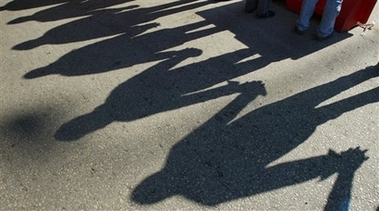 Beirut, Jan 14 (DPA) The slogan ‘I love life’ is currently covering billboards around the Lebanese capital as the government and the opposition compete over who loves life and Lebanon more. It is a campaign used by the March 14 Coalition and has been countered by slogans from the opposition that read: ‘We love life without debt or outside interferences.’The billboards represent the competition between Lebanon’s government and its allies, and the opposition to show their love for Lebanon.’We love life with pride,’ reads a billboard for the Lebanese Shia movement Hezbollah. A few metres away, a large billboard pasted up by the forces that support the government of Premier Fouad Seniora says: ‘We want to live. We love life.’
Beirut, Jan 14 (DPA) The slogan ‘I love life’ is currently covering billboards around the Lebanese capital as the government and the opposition compete over who loves life and Lebanon more. It is a campaign used by the March 14 Coalition and has been countered by slogans from the opposition that read: ‘We love life without debt or outside interferences.’The billboards represent the competition between Lebanon’s government and its allies, and the opposition to show their love for Lebanon.’We love life with pride,’ reads a billboard for the Lebanese Shia movement Hezbollah. A few metres away, a large billboard pasted up by the forces that support the government of Premier Fouad Seniora says: ‘We want to live. We love life.’
Since Christmas, red-and-white posters were pasted up around Beirut proclaiming ‘I love life’ in Arabic, English and French in an apparent reaction to Hezbollah’s culture of martyrdom. ‘There is a group in Lebanon who advocate death and love war and they put the idea of military confrontation above any other consideration,’ said a follower of the government. ‘We are telling them not all the Lebanese back your views and we love to live.’ Said Hezbollah’s Zuheir Safieddine: ‘This is silly. The government forces think only they love Lebanon and they love life, but we tell them we love Lebanon to be free from political, social, financial debt.’Opposition follower George Aoun remarked: ‘We tell them (the government forces) that advertising never bought the trust of the people. Go invest in building constitutions and show goodwill in boosting the economic cycle.’
However, the billboards have angered some Lebanese who consider themselves neutral in the political crisis dividing the country. They criticise both sides for pulling the country into civil strife. One such critic is Najwa Baydoun, a Lebanese social worker.’Who are they (opposition and government forces) kidding? Human minds can be limited and blind sometimes, but they should not use the word ‘love’ in their political war,’ said Baydoun.
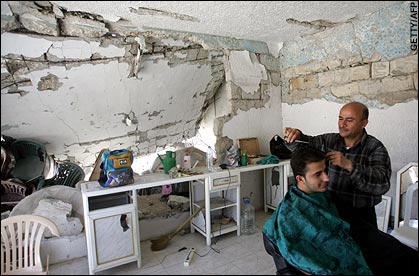 By Michael Hirst in Beirut, Sunday Telegraph, Talking politics is normally a favourite pastime in Lebanon. But after a summer of war and an autumn of government in deadlock, Beirut’s shops, cafes and barbers have drawn a line under the heated national dialogue by banning all talk of current affairs on their premises.With the country’s inter-religious tensions at levels not seen since the bitter civil war of the 1980s, the outcome of the trial of strength between the government and the Hizbollah-led opposition is on everyone’s mind.But with little prospect of a swift resolution, and fed up with the custom lost due to a continuing six-week sit-in by Hizbollah protesters in central Beirut, many of the capital’s businesses now want a polite silence.
By Michael Hirst in Beirut, Sunday Telegraph, Talking politics is normally a favourite pastime in Lebanon. But after a summer of war and an autumn of government in deadlock, Beirut’s shops, cafes and barbers have drawn a line under the heated national dialogue by banning all talk of current affairs on their premises.With the country’s inter-religious tensions at levels not seen since the bitter civil war of the 1980s, the outcome of the trial of strength between the government and the Hizbollah-led opposition is on everyone’s mind.But with little prospect of a swift resolution, and fed up with the custom lost due to a continuing six-week sit-in by Hizbollah protesters in central Beirut, many of the capital’s businesses now want a polite silence.
Banks have emailed staff requesting that they refrain from engaging in political conversation with customers, and some companies have gone as far as to block political websites from their computer systems."Signs are going up in shops, restaurants, nightclubs and even the backs of cars asking people to stop talking about politics," said Tarek Hamid, 42, who owns a boutique designer clothes shop in central Beirut. "If the politicians want to fight they should do it in the parliament and not go to the streets where they stop the people working."
By MAYSSA EL KHAZEN,
Introduction:
In today
إعتبر الوزير السابق وديع الخازن في حديث تلفزيوني اليوم أن الرئيس لحود منفتح على أية مبادرة تؤمن 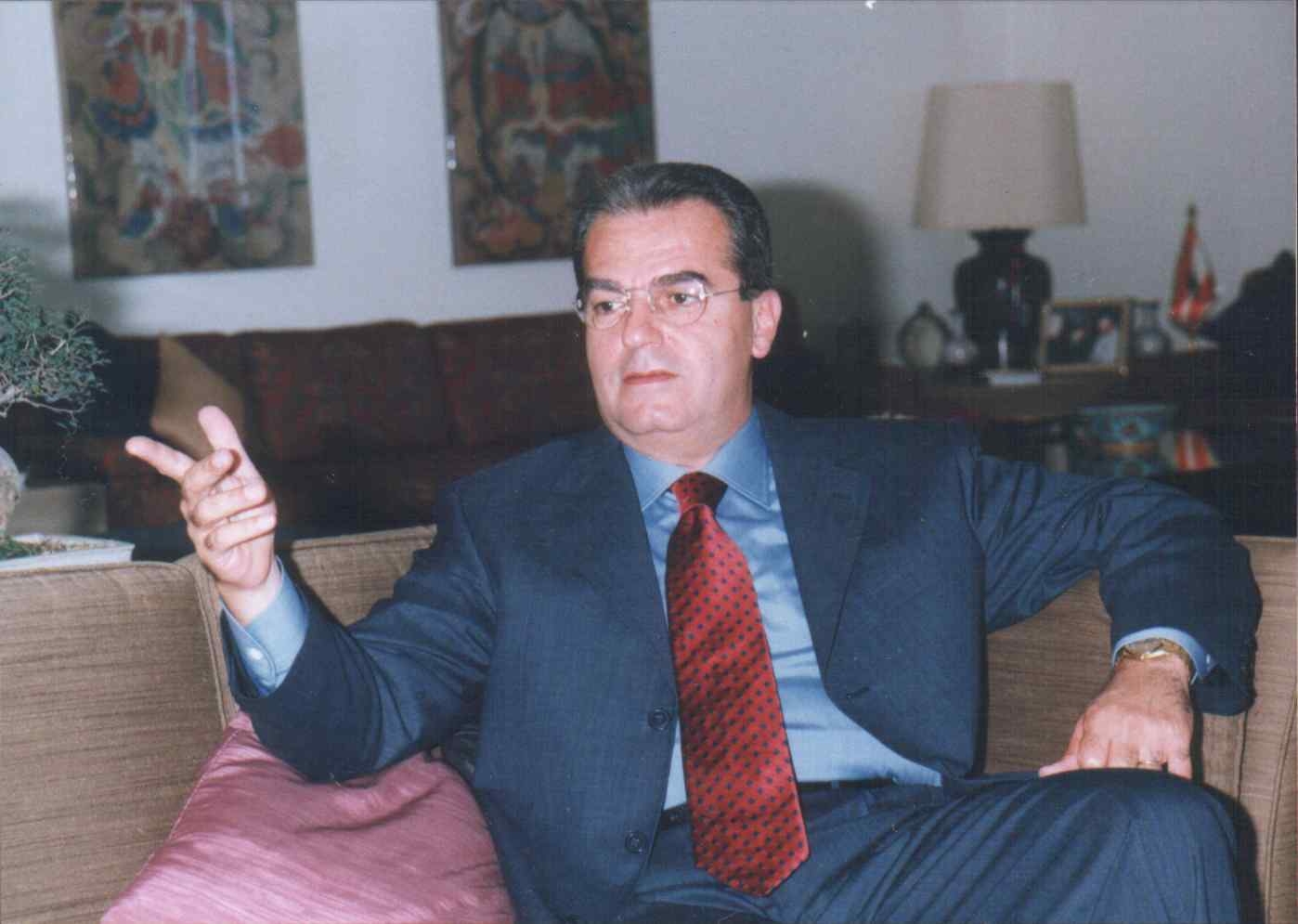 الإنفراج على صعيد الأزمة الحكومية لأنه حريص على الأمانة التي أولاه إياها الدستور اللبناني وهذه الأمانة تخوله الرجوع إلى الدستور في كلّ خَطوة يخطوها مما يجري فضلاً عن قلقه على الأوضاع الإقتصادية والمعيشية التي تطاول كلّ المواطنين بلا إستثناء.
الإنفراج على صعيد الأزمة الحكومية لأنه حريص على الأمانة التي أولاه إياها الدستور اللبناني وهذه الأمانة تخوله الرجوع إلى الدستور في كلّ خَطوة يخطوها مما يجري فضلاً عن قلقه على الأوضاع الإقتصادية والمعيشية التي تطاول كلّ المواطنين بلا إستثناء.
ولفت أن مبادرة الرئيس الحص لا تبتعد كثيراً عن تفكير رئيس الجمهورية من الناحية الدستورية حيث يُصِرّ على أن المحكمة الدولية هي من شأن رئيس الجمهورية بحسب المادة 52 من الدستور التي تخوله المفاوضة في عقد المعاهدات الدولية وإبرامها بالإتفاق مع رئيس الحكومة. كما أنه يؤكد في مبادرته على صوابية موقف الرئيس لحود من الحكومة اللادستورية واللاشرعية والتي لا يمكنه أن يستجيب لأيّ قرار أو مرسوم يصدر عنها بعد إستقالة وزراء الطائفة الشيعية الكريمة ذات الثقل التمثيلي الشعبي



